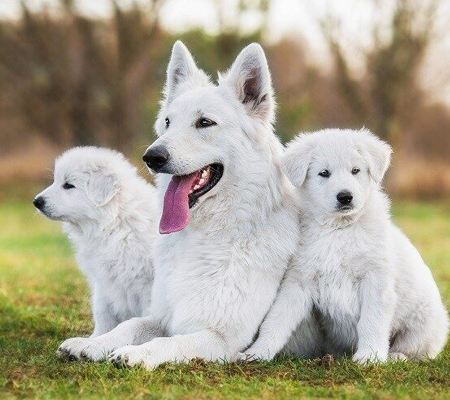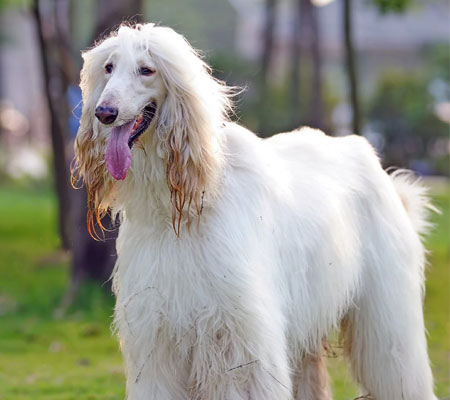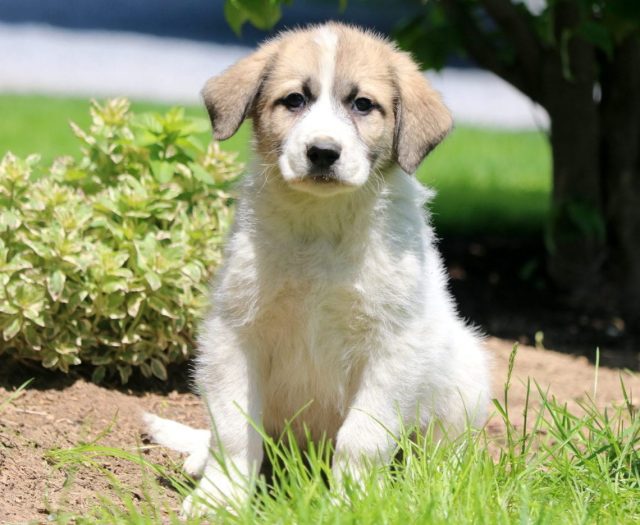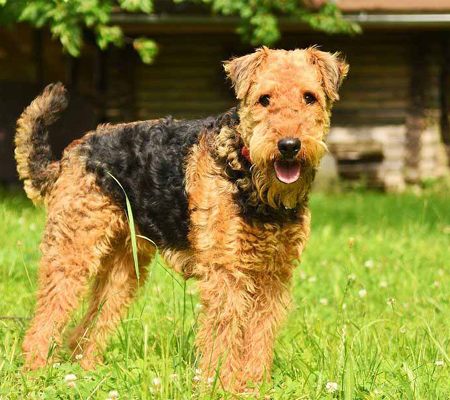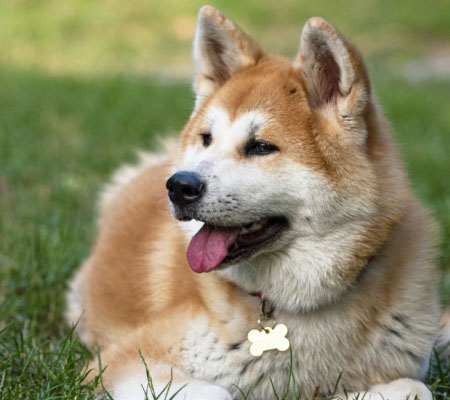Canaan Dog
The Canaan Dog is a pariah dog that has persisted
for thousands of years in Israel's arid area. Some Bedouins and Druse still use
this dog breed to herd and defend their flocks and encampments today, believing
it to be the dog breed used by the Hebrews in biblical times to herd and guard
their flocks and encampments.
Even though they are purebred canines, they may
end up in shelters or rescue organisations. Keep in mind to adopt! If you want
to bring a dog home, don't go shopping.
Canaan Dogs are companion dogs and compete in dog
sports such as conformation, agility, and obedience in Europe and North
America. They're versatile and can even live in apartments provided their
owners can match the breed's activity requirements. They do, however, require
strong leadership and constant training as an old pack breed. They're
intelligent, but they're also obstinate. Positive reinforcement will result in
a dog who is eager to please.
Canaan Dog Highlights
Breed Size
Large
Nature
Playful, Friendly
Energy Level
Active
Intelligence
High
Barking Level
When Necessary
Coat Length
Short
Breed Group
Working
Droll Amount
Low
Good with
Familes, Children, Dog
Feed Level
Medium, High
Colour Type
Black, cream, golden, liver, tan, red.
Other Facts
Easy to kept at home, easy to train, easy to walk, easy to groom.
Canaan Dog History
Exodus describes Canaan — ancient Palestine and
Phoenicia from around 3,000 BCE — as a pleasant and spacious land flowing with
milk and honey in the Bible. There were herds of sheep and goats, and where
there are flocks, there are dogs. Kelef Kanani, Hebrew for "Canaan
Dog," was the name given to the canines of these ancient Middle Eastern
settlements. The Kelef Kanani was likely quite similar to his modern-day
descendent, the Canaan Dog. Dogs with silky coats, prick ears, and bushy tails
curving over their backs are seen in tomb artwork from Egypt's Beni Hassan,
which date from 2200 to 2000 BCE. They had no doubt the same alert, attentive,
inquiring expression as today's Canaan Dog, a breed that may well be a living
image of the ancient Canaan.
In the past, Middle Eastern herding dogs kept
their charges from straying, safeguarded them from predators or robbers, and
alerted them when danger was approaching. However, the Canaan Dog became
jobless over time as a result of Roman invaders' invasions and the scattering
of the land's population to the distant corners of the globe. He withdrew to
the rugged deserts of southern Israel, where he lived a nomadic existence
reliant on his wits and fitness. He occasionally continued his itinerant
lifestyle, working with Bedouin desert nomads or serving as guards for the
Druse, religious groups of hill people who lived on Mount Carmel and other
parts of what is now Syria, Lebanon, Jordan, and Israel. This has sculpted me.
The Canaan Dog lived free in the desert for
millennia, but in 1935, world events conspired to draw him back into human
society. Not only was World War II looming, but so was the possibility of a
Jewish state. The area's military services were seeking for a desert-tough
guard and patrol dog, while isolated Jewish villages in Palestine required
security canines that could resist desert conditions. Professor Rudolphina
Menzel of the University of Tel Aviv's department of animal and comparative
psychology was tasked with creating a dog that would fit these requirements.
Her original aim was to work with well-known breeds, but she couldn't get
Canaan Dogs out of her mind after seeing them in the desert. They were prepared
for anything, and they knew how to survive.
Dr. Menzel and her husband bought a few desert
dogs and started breeding them, documenting and improving their lineages.
During World War II, they trained their new breed for sentry duty, land mine
detecting, and message delivery, and they served with the Middle East Forces.
Some of the dogs went on to work as guide dogs after the war. The Palestine
Kennel Club had 150 of them registered by 1948.
Ursula Berkowitz of Oxnard, California, brought
four Canaan Dogs into the country in 1965. In the same year, the Canaan Dog
Club of America was founded. The United Kennel Club and the American Kennel
Club both recognised the breed in 1992 and 1997, respectively. When Ch.
Catalina's Felix to the Max became the first Canaan Dog to participate in the
Herding Group at the Westminster Kennel Club show in 1998, the breed gained
global attention. He's still an uncommon breed, ranking 150th out of 155
AKC-registered breeds and variations.
18-22 inch 18-25 kg 10-13 year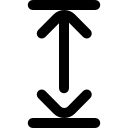
Height

Weight

Life Span
Canaan Health and Care
Canaans are a sturdy breed with no known
inherited health issues.
Find a reliable breeder who will show you health
clearances for both your dog's parents if you're buying a puppy. Health
clearances demonstrate that a dog has been checked for and cleared of a certain
disease. You can expect to see health clearances from the Orthopedic Foundation
for Animals (OFA) for hip dysplasia (with a score of fair or better), elbow
dysplasia, hypothyroidism, and von Willebrand's disease in Canaans, as well as
thrombopathia clearances from Auburn University and eye clearances from the Canine
Eye Registry Foundation (CERF).
Canaan Care
The Canaan's strong undercoat allows him to spend
time outside in all types of weather, but he should be kept within when his
owners are there. To keep him safe from traffic and fights with other dogs, he
needs a properly enclosed yard. He's easy to housetrain if you keep him on a
regular schedule.
When left to their own ways, Canaans enjoy
digging and may create huge excavations in a short amount of time. Provide them
with their own digging space or engage them in other activities to divert their
attention away from digging.
The Canaan does not need strenuous activity. He's
typically content with a few of short walks each day, or a stroll plus some
active backyard fun.
Canaan Dog Breed Care Tips and
Important Instructions
A well-adjusted Canaan dog requires early and
persistent training and socialisation. This athletic breed requires daily
exercise as well. And simply the most basic grooming is required.
Canaan dogs require moderate activity on a daily
basis. At least two 30-minute walks each day are recommended. This dog can also
benefit from jogging and trekking. Furthermore, allowing your dog to run free
off leash in a secure place while playing fetch and other activities is great.
Agility and herding are great ways to keep this intelligent breed's mind and
physique in shape while also strengthening the link between dog and human.
The coat of a Canaan dog is usually quite clean.
Depending on how dirty your dog gets, it only needs a wash every few of months.
Brush at least once a week to get rid of any stray hair. Shedding tends to rise
a couple of times a year, usually in the spring and fall, necessitating more
regular brushing.
Check your nails once a month to check if they
need to be trimmed. Also, clean your dog's teeth at least once a day. Check for
wax accumulation, discomfort, and other irregularities in its ears at least
once a week.
Canaan Feeding
1.5 to 2.5 cups of high-quality dry food each
day, split into two meals, is the recommended daily quantity.
The amount of food your adult dog consumes is
determined by his size, age, build, metabolism, and degree of activity. Dogs,
like people, are unique individuals that require different amounts of food. It
practically goes without saying that a dog that is very active will require
more than a dog who is sedentary. The type of dog food you buy makes a
difference as well; the better the dog food, the more it will nourish your dog
and the less you'll have to shake into his bowl.
Rather of putting food available all the time,
measure his food and feed him twice a day to keep your Canaan in good form.
Give him the eye and hands-on tests if you're not sure if he's overweight. Look
down at him first. There should be a waist visible. Then, with your thumbs down
his spine and fingers stretched downward, place your hands on his back. Without
pressing too much, you should be able to feel but not see his ribs. If you
can't, he'll need to eat less and exercise more.
Canaan Fun Facts
- Prior to the entrance of the Israelites, the
Canaanites inhabited the territory of Canaan.
- Canaan includes the modern-day states of Israel,
Palestine, Lebanon, Syria, and Jordan.
- "To be low, submissive, and
subservient" might be the meaning of the name Canaan.
- Canaanites have been mentioned in writing for
about 3800 years.
- The majority of the data is based on what others
have written about them.
- The Egyptian "Amarna Letters" (about
1300 BCE) include correspondence between Pharaoh and different Canaanite monarchs.
- Pharaoh has a great deal of control over these
locations.
- The individuals that live in these locations do
not live in groups.
- There are several parallels between biblical
scriptures.
- Some of God's names are interchangeable, such as
El.
- They also had goddesses and gods who are
feminine, such as Asherah.
- Baal is the grandson of El and Asherah.
- Baal is the deity of storms and rain.
- Elijah defeats Baal on Mount Carmel.
Canaan Home Training Tips and
General Information
Love is all a dog requires.
One of the most prevalent dog claims I hear as a
canine behavioural consultant is that all a dog requires is love. Is that
correct or incorrect? You might be surprised by my response!
There are four things you
must do correctly.
It doesn't have to be difficult to train your
Canaan Dog puppy. You can influence your puppy's behaviour and make training
easier right now by doing four simple things.
What Should You Teach? (and
When)
Dog training begins the minute your puppy arrives
at your home. If you utilise the incorrect training approach, your puppy will
begin to make decisions about how he wants you to fit into his life, which will
lead to conflict and behavioural issues. You must respond appropriately to
anything your puppy does, or he will learn the incorrect things. Here is my
suggested training schedule (what to teach and when to teach it) for your
Canaan Dog puppy.
Teach Your Canaan Dog To Respect You I utilise
and suggest "Respect Training" as a dog training approach for Canaan
Dogs. When you say "No," a dog who respects you will stop what he's
doing and do what you say. Teaching your dog to respect you entails engaging in
certain interactions with him that promote respect.
Solving Behavioural Issues
"How can I stop my dog from doing (a
specific harmful behaviour)?" is one of the most often asked queries by
dog owners. Whatever the infraction, my response is usually always the same.
Buddy Became a Good Dog After Watching These Dog
Training Videos
When you can watch the proper training tactics in
action, it's sometimes simpler to train your puppy (or adult dog). These dog
training DVDs, which are focused on respect and leadership, come highly
recommended.
Teach The Correct Words In
The Correct Context
My training approach for Canaan Dogs comprises
teaching certain phrases in precise ways so that your dog not only learns the
words but also develops the respectful attitude that motivates him to obey you.
Teach your dog to comprehend what you're saying by teaching him words. Teach
those terms in the proper context, and he will follow your instructions.
Your Canaan Dog's
Housebreaking
There are two essentials to breaking into a
house. There are only two, but you must get them both correct. And I don't mean
50 percent correct; I mean 100 percent correct. Otherwise, you'll wind up with
a dog that is only 50% toilet trained, which no one wants. So there you have
it: your two keys to breaking into a house.
Canaan Dog Socialization
Socializing your Canaan Dog entails teaching him
how to interact respectfully with strangers and other animals.
FAQS
|
Can you tell me a fun fact about Canaan? |
|
Canaan was an ancient Levantine nation. It was the country that God
promised to Abraham and his descendants in the Bible. From from 2000 BCE to
the time of the Bible, the Canaanite people inhabited in this area. It
encompasses a portion of what is today Israel, Palestine, Syria, and Lebanon. |
|
What is the modern name for Canaan? |
|
The land of Canaan was located in the southern Levant, which includes
Israel, the West Bank and Gaza Strip, Jordan, and the southern parts of Syria
and Lebanon today. |
|
What did the Canaanites have a reputation for? |
|
The ancient Canaanites were idol worshipers who committed human sacrifice
and indulged in aberrant sexual conduct, according to the Bible. |
|
What exactly is Canaan, and why is it significant? |
|
Beginning in the late second millennium bce, or possibly earlier, the
Israelites colonised and conquered Palestine, or Canaan, and the Bible
justifies their occupation by connecting Canaan with the Given Territory, the
land promised to the Israelites by God. |
|
Why did God give Israel Canaan? |
|
God then promised Abraham that his descendants would inherit the country
that the Canaanites had occupied at the time, and that Yahweh would be their
God and they would be his people as a single nation group. |
|
Who are the Canaanites of today? |
|
According to recent study, the inhabitants of modern-day Lebanon may
trace their genetic origins back to the Canaanites. During the Bronze Age,
some 4,000 years ago, the Canaanites lived in the Levant (modern-day Syria,
Jordan, Lebanon, Israel, and Palestine). |
Canaan Dog Unique Name
| Male Name | Female Name |
|---|---|
| Brady | Autumn |
| Chester | Casey |
| Clyde | Dakota |
| Coco | Fiona |
| Dane | Ginger |
| Dodge | Hailey |
| Eddie | Harley |
| Flash | Kate |
| Kane | Minnie |
| Miles | Muffin |
| Oreo | Sasha |
| Radar | Sugar |
| Snoopy | Tessa |
| Sparky | Brandi |
| Teddy | Brook |
| Thor | Buttercup |
| Toby | Buzzy |
| Bailey | Kerry |
| Tex | Laney |
| Twinkle | Nova |

